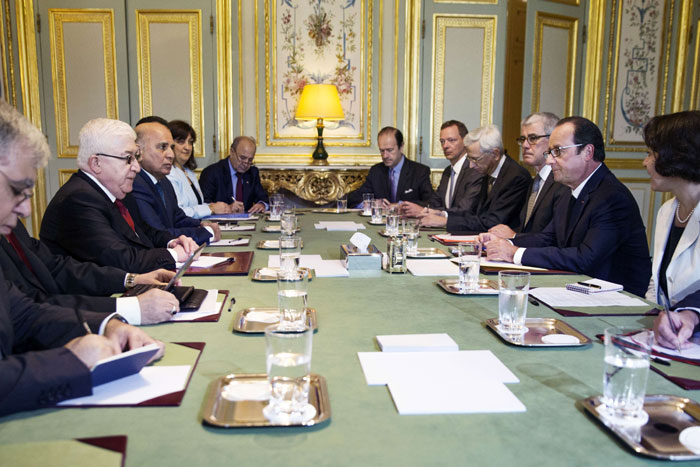French President Francois Hollande and his Iraqi counterpart Fuad Masum meet at the Elysee palace ahead of an international conference at the French Foreign ministry in Paris on Monday.
AFP
Top officials from around the world, including US Secretary of State John Kerry, met in Paris on Monday to fine-tune their strategy against Islamic State militants, with emotions running high after the beheading of a third Western hostage.
Just hours before the conference began, France announced it was joining Britain in carrying out reconnaissance flights in support of the US air campaign against the jihadists.
"This very morning, the first reconnaissance flights will be carried out in agreement with the Iraqi and Emirati authorities," Defence Minister Jean-Yves Le Drian told French troops, including pilots, at the Al-Dhafra base in the United Arab Emirates.
And Iraqi President Fuad Masum called ahead of the conference for a "quick" aerial campaign.
"They need to act quickly because if there is a delay, if this campaign and this support for Iraq is delayed, maybe Daesh will occupy other territories and their threat will be even bigger," he told French radio, using an alternative name for IS.
The gruesome beheading of British aid worker David Haines has increased the urgency of the Paris talks, as Kerry seeks to shore up participation in the US-led coalition that aims to destroy IS.
Prime Minister David Cameron vowed on the eve of the conference that Britain will hunt down those responsible for the aid worker's murder, describing them as the "embodiment of evil".
Haines was the third Western hostage to be beheaded by the militants in less than a month. Islamic State (IS) released a video Saturday showing his killing and issued a death threat against another British captive, Alan Henning.
President Barack Obama offered US support for its "ally in grief", after two Americans were killed by the jihadists, while the UN Security Council condemned the "heinous and cowardly murder."
Haines, 44, who was taken hostage in Syria last year, had previously been shown alive in the video of US journalist Steven Sotloff's killing.
His attacker - apparently the same man speaking in a British accent as in the videos showing the killing of the US hostages - told Britain the alliance with the US will "accelerate your destruction" and will drag the British people into "another bloody and unwinnable war".
Obama has set out a strategy to defeat IS that would include air strikes in Syria and expanded operations in Iraq, where US aircraft have carried out more than 160 strikes since early August.
The US leader also foresees training "moderate" Syrian rebels to take on IS and to reconstitute the Iraqi army, parts of which fled an IS blitzkrieg across northern and western Iraq.
Kerry, who has been touring the Middle East to drum up support for the coalition before travelling to Paris for the talks, said "all bases are covered" regarding the US-led international coalition.
He told CBS's Face the Nation that there were allies willing to join the US in air strikes. Some had offered to put troops on the ground, he said in the interview aired on Sunday, adding: "But we are not looking for that at this moment anyway."
"Every single aspect of the president's strategy, and what is needed to be done in order to accomplish our goal, has been offered by one country or multiple countries, and all bases are covered," Kerry said.
Opposition forces would do the fighting on the ground in Syria, augmented by US and allied air support, he said. Washington would not coordinate air attacks with the Syrian regime of Bashar al-Assad, but would ensure their forces do not come into conflict.
Australia is among the latest to make a concrete commitment to the growing coalition, with Prime Minister Tony Abbott saying Canberra would deploy 600 troops to the United Arab Emirates, a regional Washington ally.
Ten Arab states, including Saudi Arabia, are among the countries backing the coalition.

